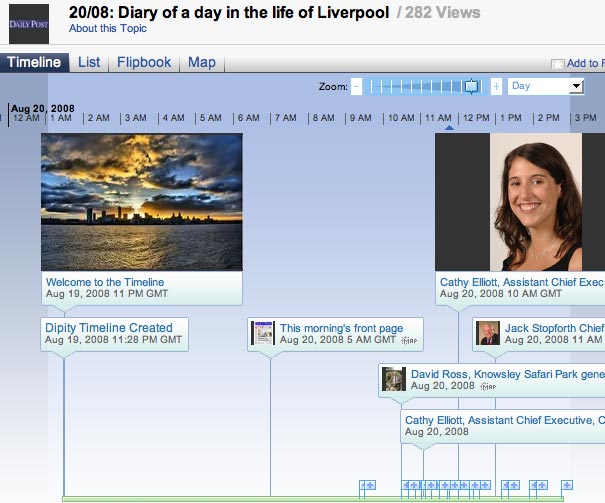The Hub and Spoke laying out may be in vogue for the majority of those adapting to an integrated newsroom but you’d be hard pressed to call Trinity Mirror’s Liverpool nerve centre anything other than an archipelago.
Alison Gow, deputy editor of Liverpool Daily Post, gave Journalism.co.uk a quick tour and explained how a partially rather than fully integrated newsroom for Liverpool’s Daily Post and Echo newspapers and a portfolio of weeklies served them best.
Similar to other large cities in the UK, Liverpool’s morning paper, the Liverpool Daily Post (typically 15,000 copies circulated per day) and the evening Echo (109,000) serve vastly different markets. To account for this the newsroom has integrated but also demarked areas where each paper’s interest is best served by not mixing processes.
The newsdesks of the Post & Echo had previously been fully integrated but the unsuccessful experiment lasted only 18 months and end in 2001, as it didn’t fully serve the needs each paper had and met with opposition from staff who were resistant to working on the other title.
“I suspect the industry is a lot more broad-minded now as we work across print, internet, TV and radio,” Gow told Journalism.co.uk.
COPY
The dailies and weekly newspapers have adapted and refined a partially integrated newsroom where the two main papers share news copy, but keep diary and features separate.
“A government minister in town would tend to be interviewed by a Post reporter,” Gow told Journalism.co.uk. “That copy would be sent by the Post newsdesk to the Echo newsdesk to be rewritten and subbed down. Echo page leads are around 350, Post 600 plus.
“The Post & Echo share a court reporter but the very distinct target audiences of both papers means what makes a splash in the Echo, gangster trials for example, may struggle to make a page lead in the Post.
“Inquests would be covered by one reporter whose copy would be shared between both papers.
“An exception would be Liverpool council meetings – mostly covered by the council reporters from both papers as it’s a contact-building exercise as much as anything.”
The Echo can also publish stories from the weeklies the day the papers are published, Gow added, as the assistant news editor has access to their content queues.
“It’s a co-operative system and involves the newsdesks, picturedesk and multimedia desks talking to each other. That’s why the command desk is so important,” added Gow.
STAFF
At the centre of the archipelago – the big island – is the command desk where Post and Echo news editors and their deputies sit along with a picture editor who works across both publications and the Echo design editor.
Reporters are title specific, as are the features and sports teams, and both papers have separate features and sports editors and deputy editors, Arts editors and motoring editors.
A multimedia head, working across both titles, also sits on the command desk. As on the web, Gow says, the two publications have ‘more fluid identities’.
Each department desks now has embedded digital journalist. Under the old system ‘they just used to sit in the corner away from everyone else’ said Gow. Now they espouse the need for web content and ensure the website remains an area of focus for each department on each title now that they break 99 per cent of their stories online.
Video is a separate entity altogether – one video journalist is responsible for managing libraries, cutting pieces and training newsroom staff and reporters in video-journalism.
She has trained eight other staff so far, giving them a week’s hands-on training so that they can manage handicams and cut footage. They aim for a new web video each day.
SUBBING
A pool of eight subs work across the Echo, the England and Welsh Daily Posts, Huddersfield Examiner, the Chester Chronicle, the Merseyside and North Wales weekly papers on a rota basis.
There are also title-specific staff who work primarily for each paper – ‘champions’ of each brand, adds Gow.
This approach has shifted subs from thinking they work for a single publication, she said, to a ‘hive-mind’ where they work across several titles.

